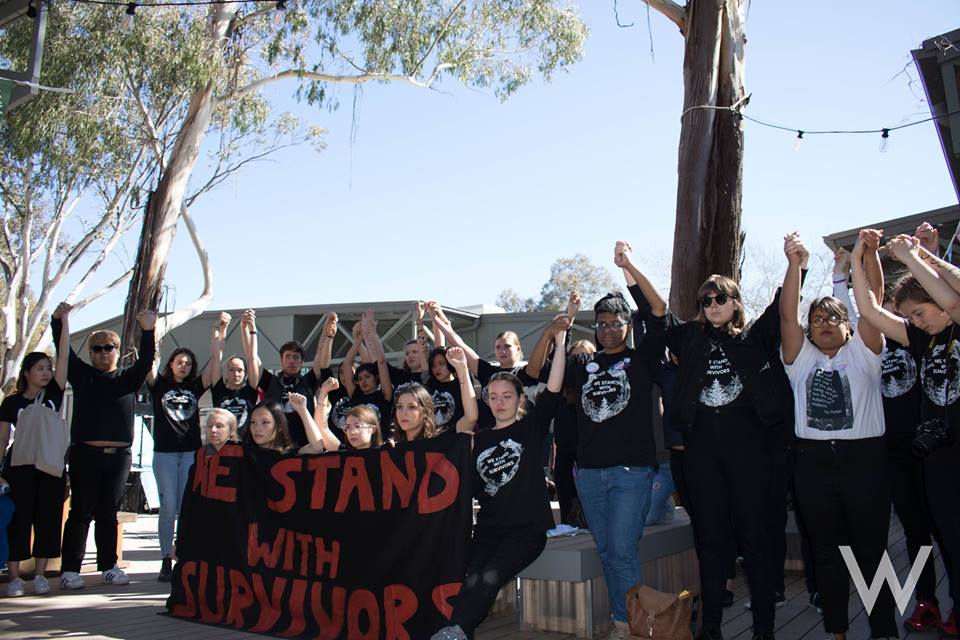The past half-decade of ANU hazing rituals have been compiled as part of a damning report on sexual assault and hazing during university O-Weeks around Australia.
The most recent ANU incident discussed in the 211-page publication, titled The Red Zone Report and prepared by activist and journalist Nina Funnell, is Burton and Garran Hall’s tradition of men surrounding a group of women during the Daddy Cool song Eagle Rock, and pulling down their pants while women remove their tops.
It also recalls the suspension of four students at St Johns’ XXIII College after 2017’s O-Week: the Daily Telegraph reported that students chanted “I wish all women were nails in my shed, then I’d grab my hammer and nail ‘em in my bed”.
The publication also refers to some lesser known incidents at ANU: in October 2013, an ANU Confessions Facebook post was released that read:
“Sometimes I want to beat the fuck out of my girlfriend because she says the dumbest things. I’ve slapped her and pushed her (she slaps and pushes me too, OK?) but sometimes I just want to give her a full fledged beating. The kind to leave bruises and blood. I know this won’t end well for me so I resist but holy fuck sometimes it’s hard… Maybe I should get some girls to do it for me so I don’t get into shit”.
Another post read:
“The best thing about living at B&G is the laundry room – and girls who forget to bring their laundry in. Sometimes when I go in to do my laundry and they’ve left their stuff unattended, I’ll snoop through someone’s stuff and nick a pair of panties or bra. I take them and pretend girls have been sleeping with me in my room when my friends come over and discover they’ve ‘accidentally’ left them behind.”
In yet another example, a post from the then-called ANU Stalkerspace (now Schmidtposting) elicited the comment “If fucking women with knives is wrong, I don’t want to be right”.
St Johns’ XXIII College head of hall, Geoff Johnston, told Woroni that none of the revelations concerning his college brought forward new information.
“The thing to realise with this report from our perspective is that it’s all historical. It’s awful to read of course, but we’ve been dealing with these issues for quite a few years to try and get rid of it,” Johnston said. “There’s no doubt we are making progress, but any cultural change is slow, and it’s a matter of getting our student leaders to work with us to get results”.
When asked whether the college was getting results with their aims to prevent hazing and sexual assault, Johnston said that they had taken recent steps, including barring a group of residents from returning to the college this year.
Laura Perkov, ANUSA’s women’s officer, told Woroni that a residential hall’s efforts were usually not enough:
“So often, ‘dealt with’ means perpetrators of violence and behaviours that create unsafe communities like those described don’t face any substantive consequences.”
The report is titled The Red Zone because that is the name given to O-Week by student activists, due to the week’s reputation for rife sexual assault and harassment. Much of the report focuses on incidents at the University of Sydney’s residential colleges.
A number of recommendations are suggested by the publication, such as improved oversight of student residences, counselling services at colleges, and greater transparency for information on residential hall culture.
Perkov told Woroni that she agreed with the recommendations, and noted that the suggestions could be reinforced by ANU’s review in college sexual assault procedures, which is due to be handed down later this year.
“This is an incredibly important time for the formation of residential communities at the ANU – structural and cultural change is a long process and it is imperative that we get this right.”
In a statement from an ANU spokesperson, the university condemned residential college hazing practices.
“In recent years, the University has worked with residential halls and colleges, including affiliated colleges, and with senior students to ensure the University is a safe and supportive place for all students.
“Many of the incidents referred to in the Red Zone report are events from previous years, and have been dealt with by the University and the respective residence.”
According to the AHRC survey released last year, students at ANU are more likely to be sexually assaulted and harassed compared to the national average. The survey revealed that there were 52 sexual assaults on campus during 2016, and over 100 sexual assaults overall.
You can read The Red Zone Report here.
We acknowledge the Ngunnawal and Ngambri people, who are the Traditional Custodians of the land on which Woroni, Woroni Radio and Woroni TV are created, edited, published, printed and distributed. We pay our respects to Elders past and present. We acknowledge that the name Woroni was taken from the Wadi Wadi Nation without permission, and we are striving to do better for future reconciliation.
